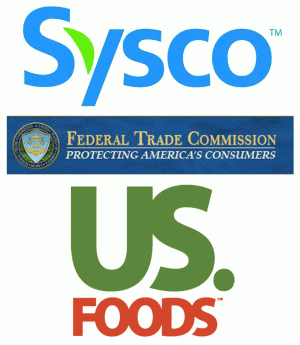6/28/2015

On Tuesday, U.S. District Judge Amit Mehta in Washington D.C. blocked a proposed merger between the U.S.’s two largest food-distribution companies, U.S. Foods and Sysco. Citing antitrust concerns, The Federal Trade Commission (FTC), along with ten state attorney generals’ offices sued the companies in February. The companies announced interest in a merger in December, 2013. Mehta issued the temporary injunction to allow the FTC to perform a thorough review of the transaction, writing “The FTC has shown that there is a reasonable probability that the proposed merger will substantially impair competition in the national customer and local broadline markets and that the equities weigh in favor of injunctive relief.” Combined, the two competitors would control roughly 75 percent of the hotel, restaurant, hospital, and school foodservice market. Sysco CEO, Bill DeLaney, said he was “profoundly disappointed” with the decision, however, saying that the company would review its options, however, DeLaney had previously said in court that he would abandon the merger if an injunction was issued. Analysts generally believe that the ruling will effectively kill the merger.
On Friday, Judge Mehta released a 128-page opinion regarding the case. Calling the merger a matter of significant national importance, he overwhelmingly sided with the FTC’s antitrust concerns. Citing that mergers such as this are why Congress enacted antitrust laws years ago, Mehta wrote, “The proposed merger of the country’s first and second largest broadline foodservice distributors is likely to cause the type of industry concentration that Congress sought to curb at the outset before it harmed competition.” He also agreed with the FTC’s assertion that the merger’s clout would ultimately lead to higher prices for consumers. Although the companies’ lawyers argued that combined, they only control about a quarter, or $65 billion of the overall $231 billion foodservice industry, Mehta believed that companies with comprehensive, mass-market services are separate from the more specialized services that thousands of local companies provide. Although the judge agreed that in some instances, the smaller local companies may compete in some sectors, they are unable to produce the wide-range of products and services that Sysco and U.S. Foods can. Judge Mehta also noted that many top-level suppliers like Sodexo and Aramark, rely on the companies for their own supply, increasing the necessity of a free-flowing market.
Despite the disappointing news, the ruling may have improved Sysco’s outlook. Although the company’s share price dropped initially in after-hours trading on Tuesday, it actually rose 3.1 percent by the end of Wednesday. Combined the companies spent hundreds of millions of dollars, although executives told the court that the merger could have saved roughly $500 million annually. Morgan Stanley analysts Vincent Sinisi and Andrew Ruben were not surprised, citing that the certainty of a resolution following the 18-month ordeal was a relief to some. They wrote, “U.S. Foods could have been a transformative acquisition for Sysco, and would have likely been viewed favorably by investors. However, we had always seen risks with combining two large companies, particularly as Sysco continues its own process of better leveraging its size and scale.” U.S. Foods, on the other hand, may not be as fortunate. As the second-largest company in a market with very little margin for error, the company may set itself up for another merger-attempt, this time with Performance Food Group (PFG), the market’s third-leading competitor. Some investors believe, however, that the company will be fine on its own, noting the company netted a first-quarter profit of $7 million fueled by a 1.8 percent increase in sales. U.S. Foods did, however, report a $65 million loss last year.
Sources:
Legal Newsline – Shaun Zinck
Nation’s Restaurant News – Jonathan Maze
New York Times – Michael J. de la Merced
Wall Street Journal – Brent Kendall


Join the conversation!